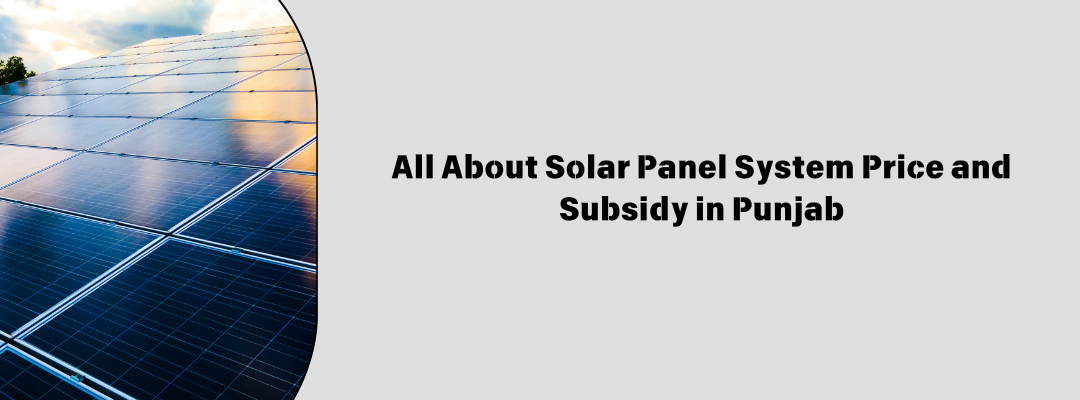The sun is more than just a source of light and warmth—it’s an abundant and renewable energy powerhouse. With advancements in photovoltaic (PV) technology, sunlight is now efficiently converted into electricity, making solar energy a cost-effective and eco-friendly alternative to conventional power sources.
Punjab, a state that receives ample sunlight throughout the year, is embracing solar energy through various government subsidy programs. This initiative makes rooftop solar panel installations more affordable for residential and commercial users, significantly reducing electricity costs while promoting sustainability.
Why Go Solar in Punjab?
- Reduced Electricity Bills: Solar energy lowers your dependence on the grid, cutting down electricity costs by up to 90%.
- Government Subsidy Support: Central and state subsidies significantly reduce installation expenses.
- Eco-Friendly Solution: Reduces carbon footprint and supports green energy initiatives.
- Long-Term Investment: Solar panels have a lifespan of 25 years, ensuring long-term energy savings.
- Net Metering Benefits: Surplus electricity is fed back into the grid, generating additional savings.
Government Subsidies for Solar Panels in Punjab
The government offers attractive incentives to make solar system in Punjab installations affordable:
Subsidy Rates for Residential Consumers
| Rooftop Solar System Capacity | Subsidy Amount |
| Up to 3 kW | ₹18,000 per kW |
| Above 3 kW up to 10 kW | ₹9,000 per kW |
| Above 10 kW | ₹1,17,000 (fixed) |
| Housing Societies (RWA/GHS) | ₹9,000 per kW for common facilities up to 500 kWp |
Who Can Apply?
- Individual homeowners
- Resident Welfare Associations (RWA) & Group Housing Societies (GHS)
- Public sector undertakings (PSUs) and commercial entities are not eligible for subsidies.
Solar Panel Prices in Punjab (Pre- & Post-Subsidy)
The cost of a solar system varies based on capacity, quality, and installation type. Here’s an estimated price breakdown before and after applying subsidies:
Estimated Solar System Costs
| System Size | Price Range (Pre-Subsidy) | Subsidy | Price After Subsidy |
| 1 kW | ₹75,000 – ₹85,000 | ₹18,000 | ₹57,000 – ₹67,000 |
| 2 kW | ₹1,50,000 – ₹1,70,000 | ₹36,000 | ₹1,14,000 – ₹1,34,000 |
| 3 kW | ₹1,89,000 – ₹2,15,000 | ₹54,000 | ₹1,35,000 – ₹1,61,000 |
| 5 kW | ₹3,15,000 – ₹3,57,000 | ₹72,000 | ₹2,43,000 – ₹2,85,000 |
| 10 kW | ₹5,31,000 – ₹6,07,000 | ₹1,17,000 | ₹4,14,000 – ₹4,90,000 |
For a precise quote tailored to your home’s energy needs, consult a trusted solar installation company in Punjab.
Step-by-Step Guide to Applying for Solar Subsidy in Punjab
Applying for a solar panel subsidy is now easier with the National Portal for Rooftop Solar. Here’s how you can apply:
Application Process
- Register Online: Visit National Portal for Rooftop Solar and sign up.
- Submit Documents: Upload property ownership proof, electricity bill, and ID verification.
- Technical Approval: Your local DISCOM will evaluate the feasibility of your installation.
- Select an Empanelled Vendor: Choose a government-approved solar vendor for installation.
- Net Metering Installation: Apply for a net meter to monitor electricity generation and consumption.
- Inspection & Approval: DISCOM will inspect your system and issue a commissioning certificate.
- Subsidy Disbursement: The approved subsidy amount will be credited to your bank account within 30 days.
Benefits of Installing Solar Panels in Punjab
Best solar panel installation company in Punjab will offer:
- Up to 90% reduction in electricity bills
- Government-backed subsidy support
- Eco-friendly and renewable energy source
- Hassle-free subsidy application process
- Increased property value
Common Questions About Solar Subsidies in Punjab
1. How long does it take to receive the subsidy?
After installation and approval, the subsidy is typically credited within 30 days.
2. Are solar subsidies available for businesses?
No, Punjab’s solar subsidies are exclusively for residential consumers and housing societies.
3. How much can I save with solar panels?
On average, a 5 kW solar system can reduce electricity expenses by ₹6,000 – ₹10,000 per month.
4. Do I need to buy solar panels from a specific vendor?
Yes, subsidies apply only if you purchase MNRE-approved solar panels and inverters through an empanelled vendor.
5. Can I apply for net metering separately?
Yes, Punjab Energy Development Agency (PEDA) allows separate applications for net metering at

